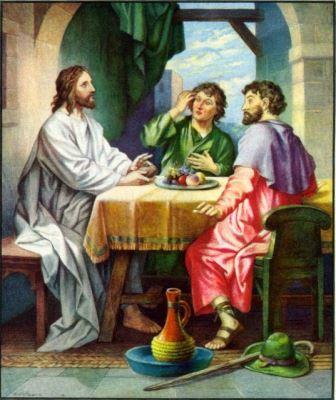
Wednesday in Easter Week
When Christians in later Centuries arranged the Easter tradition they made a mistake. Jesus died probably on Wednesday and was in the tomb 3 days and nights as He himself prophesied and he rose on Sunday (Sunday in Jewish understanding starting Saturday night, when the first 3 stars come out, after the Sabbath). He arose overnight and the tomb was empty Sunday morning. The Bible indicates he didn't die before the regular Jewish Sabbath but on Passover, the preparation day just before the High Sabbath of the Feast of Unleavened Bread, a Sabbath that occurs on whichever day of week it falls. There were 2 Sabbath's almost back to back, the high sabbath and then the regular weekly Sabbath and maybe one day between.
Jesus uncle (his mother's brother) and one of his disciples were fleeing Jerusalem on the Sunday after the Crucifixion. They had to wait until Sunday because Jews don't travel on a Sabbath. They would not have reached the next town before that first sabbath started and would have had to spend 2-3 days camping by the road, which would have looked suspicious to those searching for Jesus followers. So they waited till Sunday, and therefore before they left they heard Jesus body was missing, that he had Risen, but didn't believe it.
As they walked that Sunday they met Jesus and He walked with them on the road to the small village of Emmaus, which is about 7 miles from Jerusalem, and his own Uncle didn't recognize him. Think about that for a minute – the conversation they have is often taken as the important part but I think this is just as important. They didn't see the wounds, they saw a stranger, which means Jesus could look like ANYONE.
For I was hungry and you gave me something to eat, I was thirsty and you gave me something to drink, I was a stranger and you invited me in, I needed clothes and you clothed me, I was sick and you looked after me, I was in prison and you came to visit me.’ . . . . .Matthew 25:35,36
He was a stranger and they invited him in to stay for the night with them in Emmaus. They finally recognise him – WHEN HE BREAKS THE BREAD, and he disappears.
This all happened during the Sunday, it was still the Feast of Unleavened Bread which lasts 7 days. The Bread Jesus broke would have been Unleavened Bread – a representation of his body.
 Welcome
Welcome Calendar
Calendar Today's Word
Today's Word Lauds
Lauds Terce
Terce Sext
Sext None
None Vespers
Vespers Compline
Compline Matins
Matins